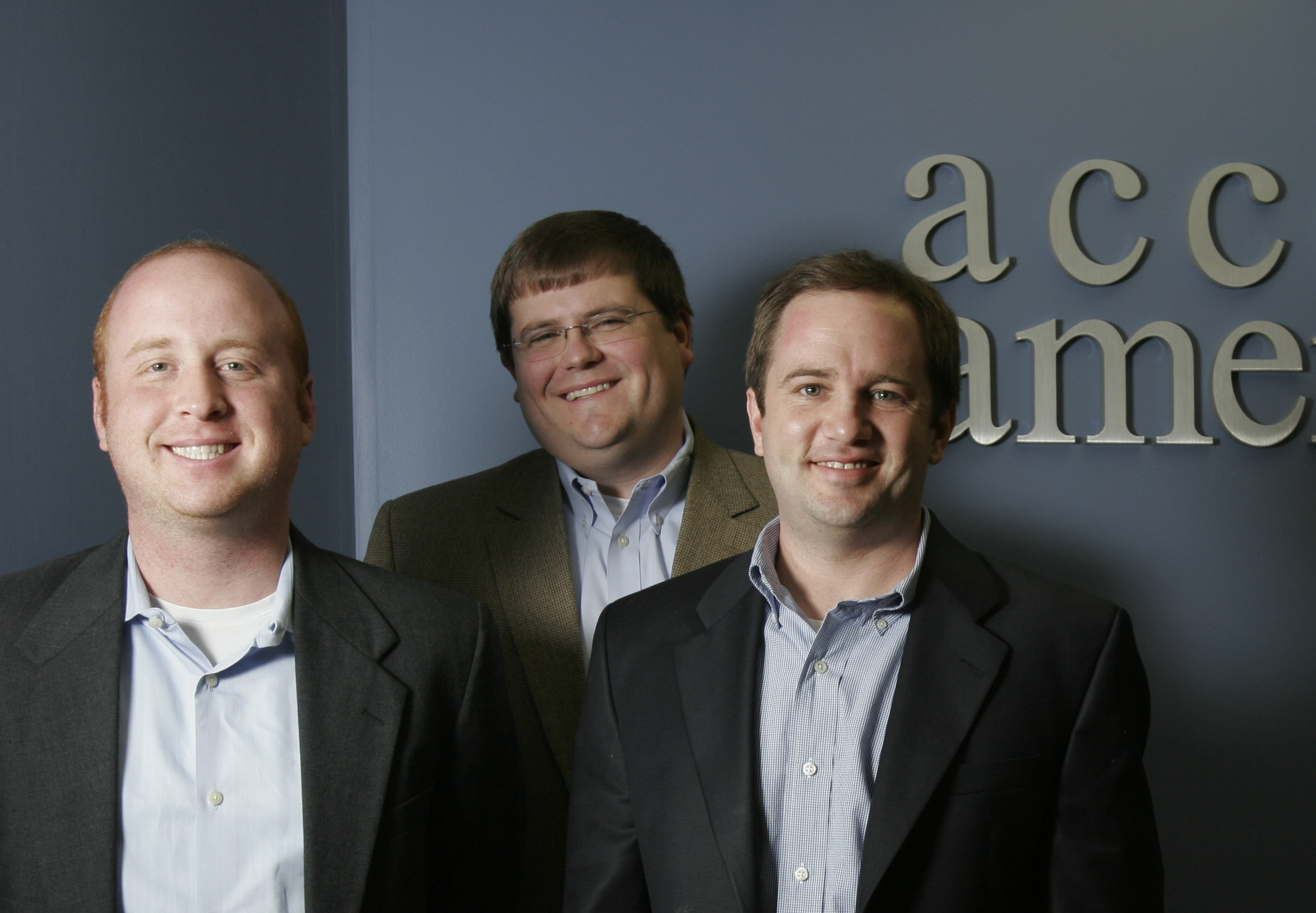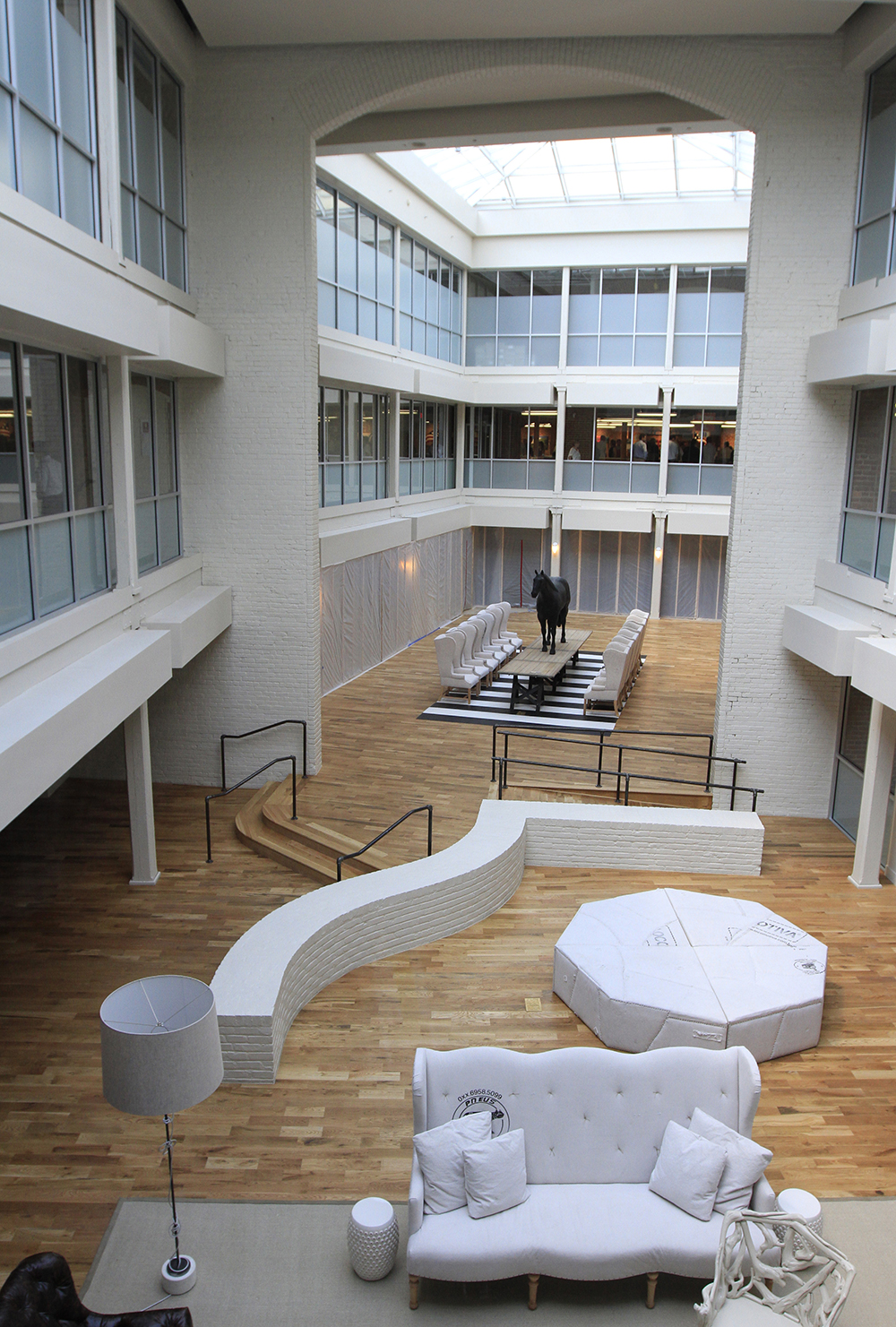READ MOREChattanooga startup Access America's deal with Coyote creates $2 billion freight giant
Access America isn't like most flashy startups. Sure, almost no one wears suits, and yes, 35-year-old co-founder Allan Davis sports a company tattoo, and it's true that employees throw footballs and do push-ups in the office.
But the Scenic City transportation firm, which on Tuesday was sold by its founders to Chicago-based Coyote Logistics in a deal valued at hundreds of millions of dollars, didn't build itself through a stylish ad-supported apps, fashionable venture-capital buyouts or through typical social-media razzle dazzle.
Rather, this 500-employee juggernaut, which projected $1 billion in sales for 2014, started its journey in the slow-moving world of bricks and bank loans.
The business baby that would grow into Access America was conceived in August 2002 by a trio of fraternity pals from Samford University - now millionaires in their mid-30s - in a back room at Key-James Brick, once a Chattanooga building-supply mainstay owned by the father of Access America co-founder Barry Large.
Large's father, James H. Large, also one of the founders of Cornerstone Community Bank, needed help hauling in large shipments of bricks for the Scenic City's vociferous appetite for new construction.
"Every business starts with a need," said Large, who is 36 years old. "Key-James was having problems getting brick into Chattanooga. We had a person in the office who would call trucking lines all day long, they had their brother's sister's cousin who had a flatbed, that's who we'd use," Large said.
It was tedious. But there would soon be a better, faster way to arrange transport. Ted Alling, also 36, who was best friends at Samford with Large and Davis and had kept in touch, was preparing to quit his new job at C.H. Robinson Worldwide Inc., the 300-pound gorilla in the third-party logistics market and future competitor.
C.H. Robinson, which posted $12.7 billion in revenue in 2013 and $415 million in net income, at one time was larger than all of its competitors combined. It's still the biggest in the market by far, though Access America officials say that they and Coyote have nibbled away at its market share in recent years. As with many large publicly-traded companies, C.H. Robinson offered a corporate work environment that was too typical for Alling.
Alling, like his Sigma Nu fraternity brothers, wasn't seeking a typical experience. There were good business ideas to learn at Robinson, but Alling wanted to be more than just another guy in pinstripes. His personal holy grail was to figure out a way to mix business and friendship, money and fun, to re-create the fraternity experience at work. That wasn't going to happen at a publicly-traded company engrossed in earnings reports, safe-harbor statements and human resource initiatives.
In 2002, on a sales call with Large and his father, Alling decided to pitch his own business idea instead of a C.H. Robinson logistics contract.
His vision for Access America idea would grow to become a $100 million company within a few years, he told Large. With help from Large's banking connections, the soon-to-be partners could use standard bank financing rather than give chunks of their venture away to private investors. They would use unusual business techniques to motivate employees in ways that an established company wouldn't. And they could do it together, the same way they partied, studied and worked their way through Samford.
"All our best friends in the world are at this company," Alling said on Monday. "It's a family."
Alling and Large agreed to be partners, they agreed to work hard and they agreed to have fun. With Davis joining shortly thereafter, they set up shop in Chattanooga with Key-James as their first customer.
In fact, Key-James would become customer, lender and landlord, with Access America operating essentially as the brick company's logistics arm. It would take four more years for Access America to pay off its debt and become wholly separate from the mother hen that had incubated it.
In the meantime, the founders had far larger worries, like how to actually run an independent business for the first time in their lives. They settled on an unorthodox model that mixes equal parts salesmanship, multi-level marketing and testosterone.
Consider a truck that makes a delivery and then returns empty to the warehouse. Traditionally, it's only making money for the first half of the trip, while its costs remain the same in both directions. That's bad business.
Access America helps find freight for the truck on its way back, generating money for the trucker on the return trip, and generating a commission for Access America's broker.
Brokers, who make up the majority of Access America, serve as a go-between for shippers and trucking companies to fill the unused space. It's like a stock market for freight space. Brokers work the phones constantly, working with small trucking operations and large transport conglomerates to fill trucks with goods that need a way to reach their destination.
The small team started locally, recruiting early clients like Komatsu, then Honest Charlie, Astec Industries and Smart Furniture. Other entrepreneurs seemed to want to help. Corky Coker, Ben Brock and Stephen Culp all wanted to see Access America win, Alling said. They wanted a local entrepreneur to succeed, as they had.
The back office at Key-James morphed into a fast-paced work environment in Warehouse Row. First dozens, then hundreds of workers competed to sell the most lads, move the most freight, get to the top of the board.
Hierarchy at Access America is determined by sales success, not office politics. Successful brokers are given fancier titles and are assigned other brokers to work under them. In a setup reminiscent of Amway or Avon, financial rewards are determined both by the broker's own hard work and the hard work of those working under him.
It's an intense, rapid-fire environment.
"We've got the entrepreneurial culture, you get back what you put into it," said Chad Eichelberger, who became president of Access America when he was 29 years old.
Eichelberger started his tenure the company at age 23 in 2005, as perhaps the seventh employee, he remembers. Today at 32, he's set to become president of brokerage in the combined $2 billion company formed by the merger of Access America and Coyote Logistics.
Like Alling, Eichelberger got involved in logistics because of C.H. Robinson. He moved to Chattanooga to accommodate his wife's new job at C.H. Robinson while he was working as a transportation coordinator for Racetrac Petroleum.
Asked if that made for awkward dinner conversation, he smiled.
"She doesn't work there anymore," he said.
The founders credit Eichelberger with much of the company's explosive success toward the second half of its meteoric 12 years as a business. Eichelberger landed many of the big accounts, they said, hitting grand slams where the company founders had hit solid singles. Eventually, they threw him the keys and walked away to pursue other interests, such as the Lamp Post Group small business incubator.
Selling the company was just the next step. At the time of its sale, Access America worked with 10,000 companies with goods to ship, more than 35,000 transport companies and hundreds of thousands of separate trucks.
Neither Large nor Davis ever doubted Alling, both said Monday. Neither was worried that someone would figure out to cut their company, which effectively serves as a middleman, out of the business process.
"It's very fragmented, very noisy," Davis said. "It's tough for trucking companies to go exclusively direct and capture everything because there's so much competition."
A lot of that competition comes from small mom and pop operations. This group is an important constituency, as more than 80 percent of trucking companies have fewer than 25 trucks.
In any given day, the company routs 1,500 to 2,000 shipments from its Chattanooga headquarters, many of which go to small mom-and-pop trucking companies that have grown to depend on Access America to remain profitable. As long as these small trucking operations exist, the need for third-party logistics companies like Access America, Coyote and C.H. Robinson will continue to exist, said Eichelberger.
"A lot of these small guys, they don't have sales teams, they don't have a large number of customers, but we're able to take those and use that pool of carriers to service those accounts," he said.
The sale of Access America to Coyote, in a way, is a multi-million-dollar vindication for Alling, Davis and Large, who built their business doing things people said they couldn't do.
While students at Samford, "everyone kept saying, enjoy this, because after college you don't get to hang out with your friends anymore," said Davis.
It's also a win for Chattanooga, a city that has celebrated its growing entrepreneurial culture but has only a few startup successes to show for it. The city's vaunted gigabit Internet, while a great marketing tool, has yet to translate into jobs at many of the city's fledgling startups.
But with the recent sale of Quickcue for $11.5 million, and now Access America for an estimated hundreds of millions of dollars, the city's startup cheerleading squad and hungry investors will gain new clout and national attention. With a venture piggy bank now valued at tens of millions of dollars, Alling and Co. will also control what could be the largest investment fund in the city.
"We're going to create a lot of new headquarters here in Chattanooga," Alling said.
Contact staff writer Ellis Smith at esmith@timesfreepress.com or 423-757-6315.


